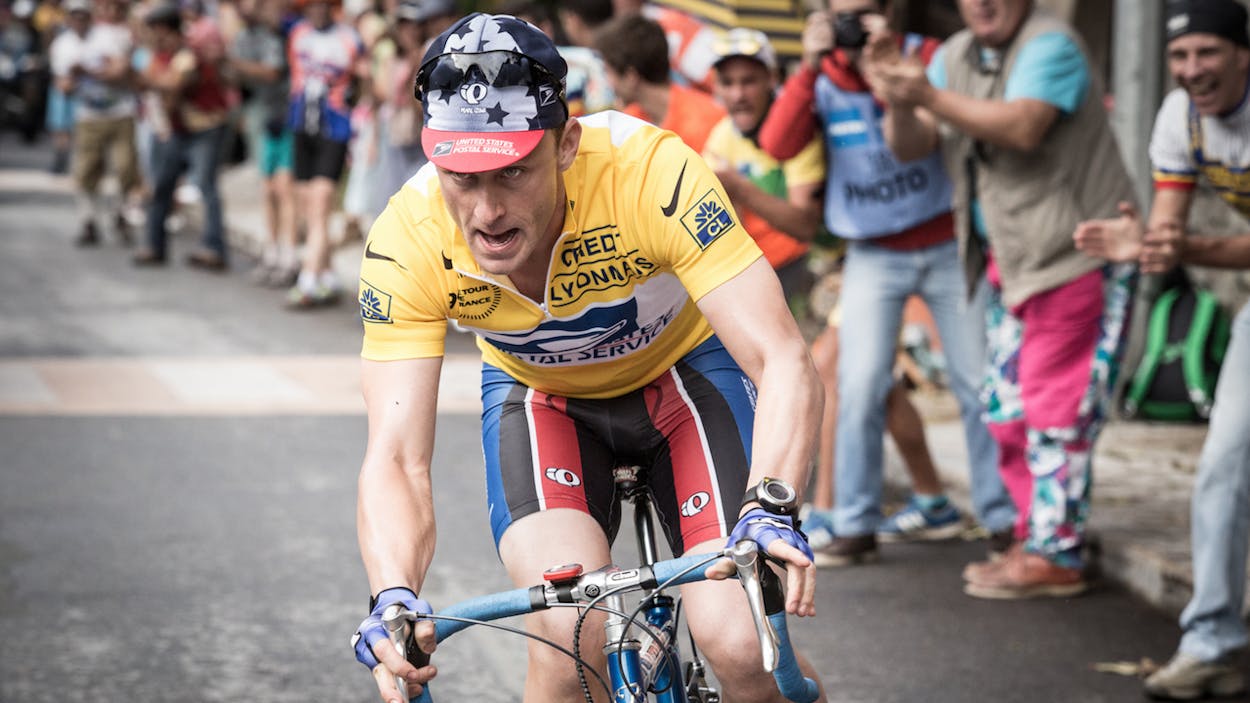There are few characters less sympathetic than Lance Armstrong. He doped his way to success, lied about doping his way to success, and bullied anyone who dared to tell the truth about how he doped his way to success. All of that is established fact. It’s why he lost all of his endorsement deals, why his seven Tour de France victories have all been vacated, why he’s barred from competing in so much as a swim meet. The word “disgraced” was coined specifically to describe someone like Lance Armstrong.
Even still, it’s difficult to watch the Armstrong hit-piece biopic The Program, which closed the Austin Film Festival on Thursday night, and not feel some sympathy for the cyclist. The film, directed by two-time Oscar nominee Stephen Frears and starring Ben Foster as Armstrong, tells the story of Armstrong’s cycling career from his very first appearance at the Tour de France in 1992 through to his full fall from grace, concluding with his confession to Oprah Winfrey in 2013.
Armstrong didn’t attend the screening at Austin’s Paramount Theatre, but if he had been, he probably wouldn’t have been too pleased with the film. There are a lot of reasons to dislike the guy, but The Program sacrifices a lot of storytelling potential to take cheap shots at the disgraced cyclist. Lance Armstrong may not deserve our sympathy, but he probably doesn’t deserve to be the subject of a film that takes such glee in deriding him.
The story of Armstrong is the story of a cheater, but The Program is uninterested in any of the other aspects of the man: Armstrong-as-cancer-survivor gets sublimated into the cheater narrative, as the film insinuates more than once that Armstrong’s cancer came as a result of his doping (a connection that cancer charity City of Hope describes as “tenuous at best”). The formation of LiveStrong is dismissed as a branding opportunity cooked up by Armstrong and agent Bill Stapleton to boost his profile for the sponsorship and endorsement deals he plans to seek when he returns to cycling. The compassion that Armstrong—even in exile—is known for showing to cancer patients gets turned into a “what do you want, a photo or a T-shirt” scene with a young boy with cancer (Foster’s Armstrong does sit down with the boy later in the scene, but that moment is presented with so little context that it’s hard to know exactly what it’s trying to say).
The film even speculates that the sort of inspirational anecdotes that Armstrong gave about dealing with the cancer treatment were phony. At one point, he tells a story about walking down a hospital hallway and refusing a wheelchair from a nurse, before the film cuts to a flashback of Armstrong accepting the wheelchair offer. At another point, a group of journalists, the film’s heroes, make jokes about how Armstrong “has balls,” a gag that is, quite literally, below the belt.
Perhaps those issues are part of why The Program has no U.S. release date set, despite its positives. The film features solid performances from a strong cast—Jesse Plemons, who dons the tragic facial hair of Armstrong’s cycling wingman (and eventual exposer) Floyd Landis, delivers a fine performance, and Lee Pace, Chris O’Dowd, and Dustin Hoffman all acquit themselves nicely along with Foster. But it’s at its most interesting when it explores the science behind doping: How a cyclist like Armstrong, because of his red blood cell count, could never be the sort of racer that could win the Tour de France without drugs, and how Armstrong and his team managed to sneak through the various tests for PED’s he was subject to. Significantly less interesting are the moments when the film plays Armstrong as a cartoon villain.
There’s a fine story to be told about Lance Armstrong—the cheating, lying bully who disgraced himself after inspiring millions—that explores how he became the villain that he revealed himself to be. There’s a fascinating story in exploring the psychology behind a man so consumed by a desire to compete and be great that he didn’t care if getting there involved lying to himself constantly, and then to the world. There’s a great movie, potentially, in a movie that explores the weakness and venality that led Armstrong to make the choices he made, that treats him as the fascinating and pathetic character that he ultimately always was. But The Program isn’t that. Instead, The Program is a celebration of how much we don’t like Armstrong now, without nuance or humanity, and in being that, it does something almost impossible—it makes us feel bad for Lance friggin’ Armstrong.








